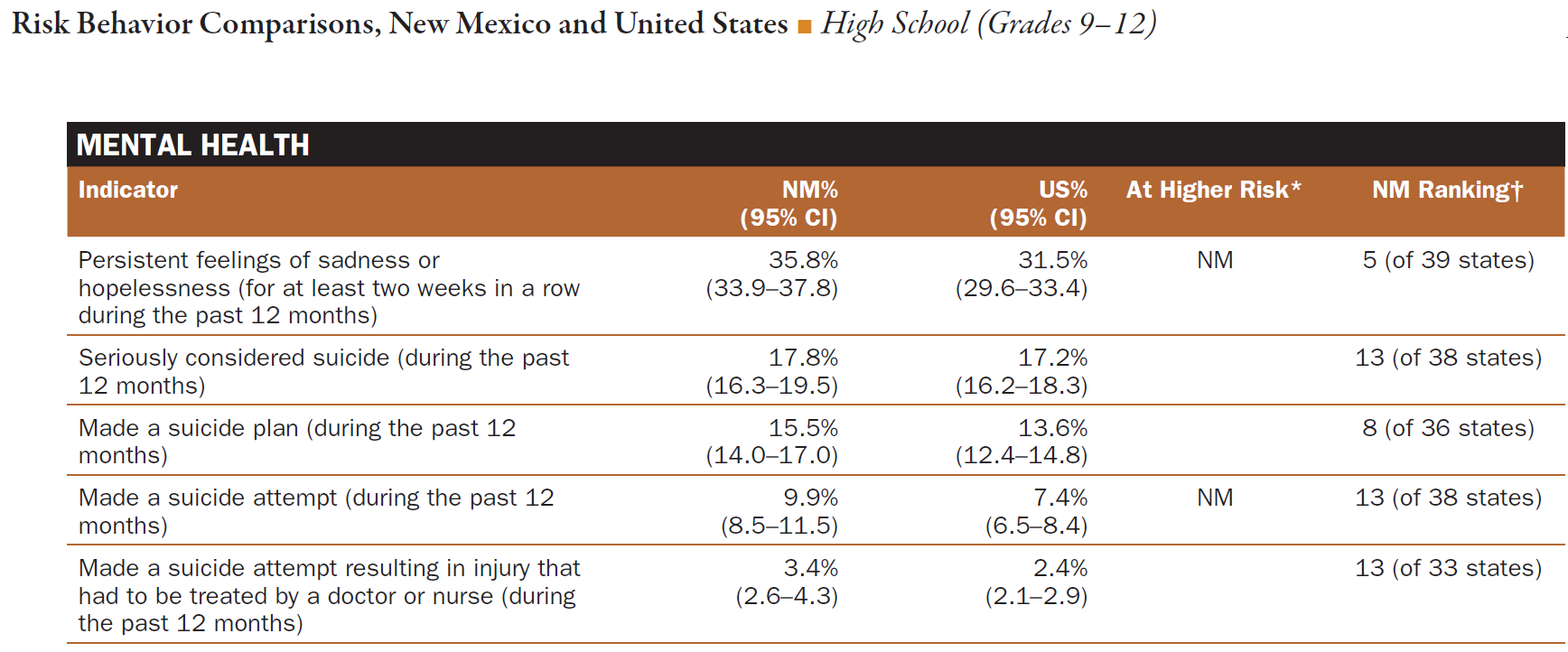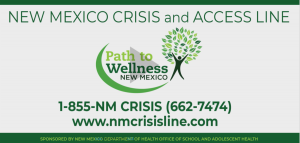Behavioral Health Resources for Covid-19
Growing up, we were taught as children the importance of getting outside, and getting exercise. However, something that’s equally as important as our physical health, is our mental health, especially school-aged kids and teens. So what exactly is the state of New Mexico doing to support the mental health needs of our children? Leslie Kelly of the New Mexico Public Education Department provides details in this interview for New Mexico Living.
The novel coronavirus (COVID-19) pandemic can cause New Mexicans of any age to feel overwhelmed, scared, anxious, or make it harder to cope with mental health conditions they struggled with before the pandemic.
Remember, even when things feel overwhelming, there is hope and there is help.
 To help combat strong feelings like anxiety, staying informed is important. The NM.gov website will continue to be updated regularly, so use that as your one-stop information source for New Mexico. As hard as you work to stay healthy, remember your emotions, thoughts, faith or spirituality, and Since the threat of COVID-19 also affects us emotionally, we have provided you with some behavioral health care resource links that can help relationships are just as important in staying healthy as washing your hands. Please reach out to the mental health providers and/ or faith and community leaders in your area to learn more about available services.
To help combat strong feelings like anxiety, staying informed is important. The NM.gov website will continue to be updated regularly, so use that as your one-stop information source for New Mexico. As hard as you work to stay healthy, remember your emotions, thoughts, faith or spirituality, and Since the threat of COVID-19 also affects us emotionally, we have provided you with some behavioral health care resource links that can help relationships are just as important in staying healthy as washing your hands. Please reach out to the mental health providers and/ or faith and community leaders in your area to learn more about available services.
Be sure to limit your viewing of repetitive news media; consider setting one or two times during the day to check media, and then give yourself a break from it for positive thoughts and activities. Viewing too much news media can make it seem like danger is even larger than it is, and become overwhelming. You can view breaking news on prevention and treatment efforts by visiting the Centers for Diseases Control and Prevention (CDC)
 Since the threat of COVID-19 also affects us emotionally, we have provided you with some behavioral health care resource links that can help:
Since the threat of COVID-19 also affects us emotionally, we have provided you with some behavioral health care resource links that can help:
- How to Take Care of Your Mental Health During Social Isolation
- Countering COVID-19 (Coronavirus) Stigma and Racism: Tips for Parents and Caregivers
- 5 Easy Ways to Reduce Coronavirus Anxiety
- How to Talk to Children About Coronavirus
- Help Loved Ones with Anxiety
- Helping Youth Experiencing Homelessness
There is no avoiding the concern over the outbreak of the coronavirus disease (COVID-19), or the extent to which it could impact the physical health of our communities, families and ourselves.
As COVID-19 (Coronavirus) spreads, and confusion over this public health crisis grows, we must stay connected with our families, friends, and communities. Together, we can help one another stay physically, spiritually and emotionally healthy.
Together, we will thrive.
American Psychological Association, Identifying Signs of Stress in Your children and Teens> Young people experience stress from a variety of sources. Some stress can be positive, but too much stress is overwhelming. Tuning into emotional or behavioral cues is important in identifying potential problems.
Supporting Student Mental and Emotional Health a webinar from the Office of School and Adolescent Health from the NMDOH.
Supporting Child and Student Social, Emotional, Behavioral, and Mental Health Needs This resource highlights seven key challenges to providing school- or program-based mental health support across early childhood, K–12 schools, and higher education settings, and presents seven corresponding recommendations. The appendix provides additional useful information, including (a) numerous examples corresponding to the recommendations highlighting implementation efforts throughout the country; (b) a list of federal resource centers; (c) a list of resources to assist educators (teachers, providers, and administrators) in implementing the recommendations; and (d) guidance on existing programs that can support social, emotional and mental health services for students.
New Mexico Launches NMConnect
The state of New Mexico has launched NMConnect, a new phone app that provides free 24-hour crisis and non-crisis support and access to behavioral health professionals who can text or talk via phone with individuals needing a listening ear or referrals to longer-term support. The app links users to the New Mexico Crisis Access Line (NMCAL), which provides safety net services statewide. NMCAL is still available via phone 24/7 toll-free by calling 1-855-NMCRISIS (1-855-662-7474). More information can be found at NewMexico.gov.
Behavioral Health in Schools
According to the 2017 New Mexico Youth Risk and Resiliency Survey (YRRS), NM high school students engaged in risky behaviors at higher rates when compared to the national average in 10 of 14 indicators. Risky behaviors are linked to poorer physical and mental health, wellness, and academic outcomes that have lifelong consequences. New Mexico is first in the nation for suicide in youth 10-17years old, and suicide is the second leading cause of death in New Mexico for youth 10—17 years old. Behavioral Health in schools supports and strengthens the social, emotional, behavioral and academic wellbeing of all students leading to improved physical, mental and academic outcomes.
According to New Mexico Administrative Code (NMAC) 6.12.6, each district and charter school is required, through Wellness Policy, to have “a plan addressing the behavioral health needs of all students in the educational process by focusing on students’ social and emotional wellbeing”.
Facts and Figures from the New Mexico Youth Risk & Resiliency Survey

The New Mexico Public Education Department supports behavioral health in schools through various initiatives:
- Support of and technical assistance to School based health centers (SBHC’s) on school campuses. SBHC’s offer comprehensive health services, meaning both physical and mental health. Mental health is just health.
- District wide Social and Emotional Learning (SEL) for all schools to support staff, students and families in better academic and social/emotional outcomes. Systematically implementing SEL in districts and schools promotes self-awareness, self-management, social awareness, responsible decision making and relationship skills for all students, staff, family and community. Research has shown a decrease in conduct issues, improved attitudes toward school, better attendance and graduation rates and well and improved staff retention in districts where comprehensive SEL is implemented.
Reach NM
The New Mexico Children, Youth and Families Department (CYFD) introduces a new service, REACH NM , that provides text-based child abuse and neglect reporting, and direct engagement with CYFD workers.
REACH NM allows you to text with a CYFD expert (from a text-message enabled cell phone) 24 hours a day, 7 days a week, 365 days a year. The REACH NM REACH NM service can be utilized to assist you in finding Pull Together resources in your community, reach out for assistance with basic needs for yourself or others, report concerns of child abuse and neglect in your home, or report suspected child abuse or neglect that may be occurring in someone else’s home or in the community.
Text 505-591-9444 to begin a conversation with a CYFD expert
You Are Not Alone
 Many people are experiencing a variety of mental health concerns during these times. Depression, Anxiety, Stress, Substance Use, Loneliness…
Many people are experiencing a variety of mental health concerns during these times. Depression, Anxiety, Stress, Substance Use, Loneliness…
There is a path to wellness. Sometimes it helps to have someone to talk to about these distresses, someone to listen, someone that makes you feel heard. If you need to talk, professional counselors are here to hear you and offer real help on the New Mexico Crisis and Access Line 24 hours a day, 7 days a week, 365 days a year.
Call us at 1-855-662-7474
On Facebook
Path to Wellness New Mexico Mental Health Mondays
A path to wellness offers information for people to help themselves or others who are experiencing mental health, suicide, or substance use concerns.
Safe and Supportive Environments
CDC Safe and Supportive Environments Creating safe and supportive environments in schools includes emphasizing aspects of the school environment that encourage students to be more engaged in their school life and feel connected to important adults at school and at home.
Ensuring students are connected to their schools and families is an important protective factor that can reduce students’ risk for a number of negative health outcomes including human immunodeficiency virus (HIV), sexually transmitted diseases (STDs), and unintended pregnancy.
National Center on Safe and Supportive Learning Environments School climate is a broad, multifaceted concept that involves many aspects of the student’s educational experience. A positive school climate is the product of a school’s attention to fostering safety; promoting a supportive academic, disciplinary, and physical environment; and encouraging and maintaining respectful, trusting, and caring relationships throughout the school community no matter the setting—from Pre-K/Elementary School to higher education.
A positive school climate is critically related to school success. For example, it can improve attendance, achievement, and retention and even rates of graduation, according to research. School climate has many aspects. Defining a framework for understanding school climate can help educators identify key areas to focus on to create safe and supportive climates in their schools.
ASCD Association for Supervision and Curriculum Development School climate refers to the school’s effects on students, including teaching practices; diversity; and the relationships among administrators, teachers, parents, and students.
School culture refers to the way teachers and other staff members work together and the set of beliefs, values, and assumptions they share. A positive school climate and school culture promote students’ ability to learn.
LGBTQ Inclusivity in Schools, CDC This national project was designed to: 1)increase understanding of the unique individual, interpersonal, and social characteristics of adolescent sexual minority males and transgender youth, 2)provide appropriate context to HIV prevention efforts; including the preferences and behaviors of ASMM and transgender youth, especially those who identify as Black or Latino, 3) inform acceptability and adherence to promising HIV prevention strategies, and 4)translate these findings into HIV prevention tools and guidance for preventing HIV among ASMM and transgender youth. LGBTQ Inclusivity in Schools: A Self-Assessment Tool
Children’s Grief Center of New Mexico, Fall 2020 Services Update
The Children’s Grief Center of New Mexico provides free peer support programs for young people ages 5 – 25 and their adult caregivers, who are grieving the death of a loved one. As our COVID-19 response has led us to provide these services via Zoom, we are able to invite bereaved students and families from across the state to participate. Learn more a about their remote services here. Children’s Grief Center of New Mexico Fall Remote Services
Building a Grief-Sensitive School Community
New York Life has launched a groundbreaking program called the Grief-Sensitive Schools Initiative to better equip educators and other school personnel to support grieving students. The New York Life workforce will provide a personal introduction to this initiative with a presentation that:
- Raises awareness about the prevalence of childhood bereavement and ‘grief in school’
- Increases the knowledge of the resources available for schools to support grieving students and their families
- Support schools/school districts in striving to become Grief-Sensitive through tangible resources, training, practical tools and a connection to a network of supportive services
All Grief-Sensitive Schools receive a welcome packet of bereavement books and a $500 grant to support their efforts in striving to be grief-sensitive. Learn more about the initiative and take the first step by pledging to be a GSSI school.
The Children’s Grief Center of New Mexico is proud to be supported by New York Life, and provides free support groups and workshops to young people and adults (ages 5 + up) coping with the death of a loved one. For more information, please call 505-323-0478 or visit www.childrensgrief.org.
Suicide Prevention Resources
Suicide Prevention Month Ideas for Action 2020
Maintaining Mental Health and Tips for Dealing with Depression by The Life Link
SEL, Health Education and Self-Advocacy
Peer Health Exchange Peer Health Exchange’s mission is to empower young people with the knowledge, skills, and resources to make healthy decisions. We do this by training college students to teach a skills-based health curriculum in under-resourced high schools across the country.
Teen Dating Violence Teen dating violence affects nearly 10% of all teenagers throughout the U.S. We provide information and resources to help bring attention to this serious issue. Learn more about teen dating abuse and Teen Dating Violence Awareness Month
Magdalena Saiz
Behavioral Health Program Coordinator
Magdalena.Saiz@ped.nm.gov
